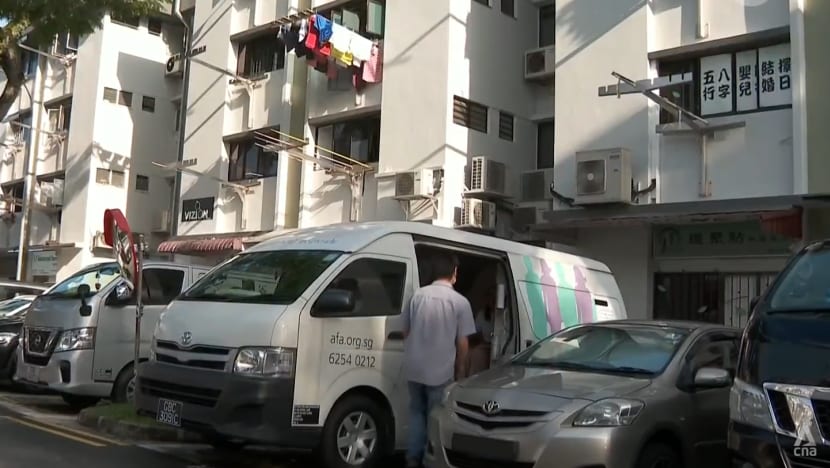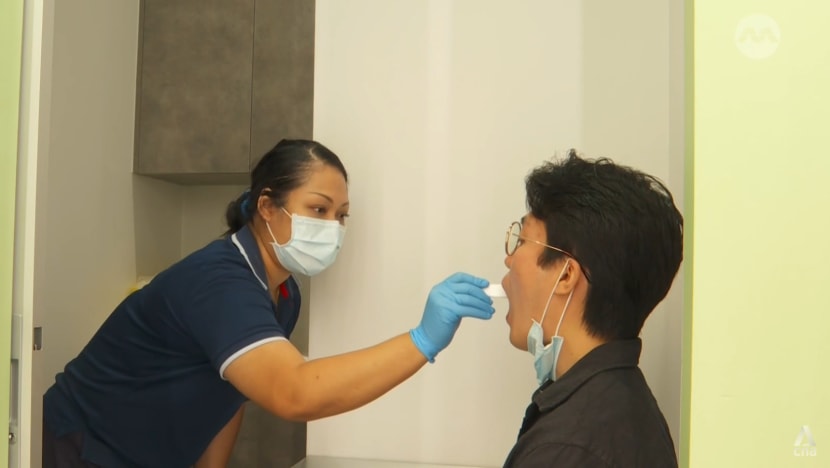HIV test providers work on being more accessible via frequent mobile services, express services
DTAP Clinic Medical Group offers an express service in doctorless individual stations.

An Action for AIDS mobile van is parked at a carpark. It allows people to walk in anytime for HIV testing.

This audio is generated by an AI tool.
SINGAPORE: A van where people can get tested for the human immunodeficiency virus (HIV) is set to become a more familiar sight.
This comes as Action for AIDS (AfA), which provides the service, looks to increase frequency to meet rising demand. The plan is for the van to make more rounds each month at new places, said AfA executive director Chronos Kwok.
"With the van, we are able to deploy at various locations around Singapore and at timings that are more convenient and accessible to those people who are working,” he told CNA.
The van also makes its rounds in office areas, and is deployed near bars and clubs over the weekends.
“The van has enabled us to reach out to new clients and expanded our presence throughout Singapore,” he added.
Currently, the non-governmental organisation (NGO) conducts 6,000 HIV tests each year, in the vehicle and at its physical clinic. The aim is to get at-risk groups to test more frequently for earlier detection.
Undergoing HIV screening is the only way to detect the virus. Most clinics in Singapore offer HIV screening as a routine service, and some offer anonymous services, where people do not need to provide any identifying details.
Results can be provided in as little as 20 minutes. Regardless of where an individual goes, results will be kept strictly confidential, the Ministry of Health (MOH) said on its website.
A HIV self-testing pilot is also underway.
UPTICK IN CASES
In MOH’s latest update on HIV statistics in December last year, Singapore saw 10 per cent more newly diagnosed cases among residents in the first 10 months of 2023 than it did during the same period the previous year.
Sexual intercourse remained the main mode of HIV transmission, accounting for 96 per cent of the cases reported in the first half of the year, the ministry said.
Of the 104 cases reported between January and June 2023, 97 per cent were male and almost half had a late-stage HIV infection at the time of their diagnosis. A majority of the cases occurred in men who have sex with men.
Mr Kwok noted that of the newly notified cases annually, only about 15 per cent get diagnosed through self-initiated HIV testing. In line with the World Health Organization, AfA recommends that sexually active adults get tested at least once a year.
The increase in cases could be because of increased testing, said Dr Jonathan Ti, chief medical officer at DTAP Clinic Medical Group.
The medical chain is one of 10 anonymous HIV test providers and has six physical clinics.
Last year, it did 2,000 tests – 60 per cent more than the previous year.
Dr Ti noted that overall, the number of people getting diagnosed has been going down over the past decade.
NEED FOR EARLY DETECTION
Despite the increased testing at DTAP’s clinics, Singapore has its work cut out in getting more people screened, he said.
While there is no cure for HIV, early detection allows patients to get anti-retroviral therapy, and they are likely to have a near-normal life expectancy.
HIV infection can take up to 10 years to develop into Acquired Immune Deficiency Syndrome (AIDS). Without treatment, people with AIDS can be susceptible to infections and become very ill.
Treatment, however, can lead to patients achieving undetectable viral loads and becoming less likely to transmit the infection.
"Treating somebody who lives with HIV has been shown to reduce the rates of transmission greatly,” said Dr Ti.

“The message of undetectable meaning untransmissible – there's quite a lot of undeniable evidence now that that's the case,” he added.
DTAP, on its part, has introduced an express service, which allows people to get tested in individual stations for privacy. Medical staff are present, but there are no doctors on site.
The results are sent via email 20 minutes after the test. In the event results are positive, patients will get referred to another clinic branch for treatment.
AfA’s Mr Kwok said HIV testing needs to be normalised, and that more education and awareness is needed.
“Stigma is often caused by fear and misinformation, so people often do not come to take a test because they are fearful of HIV or fearful of getting HIV,” he said.


















